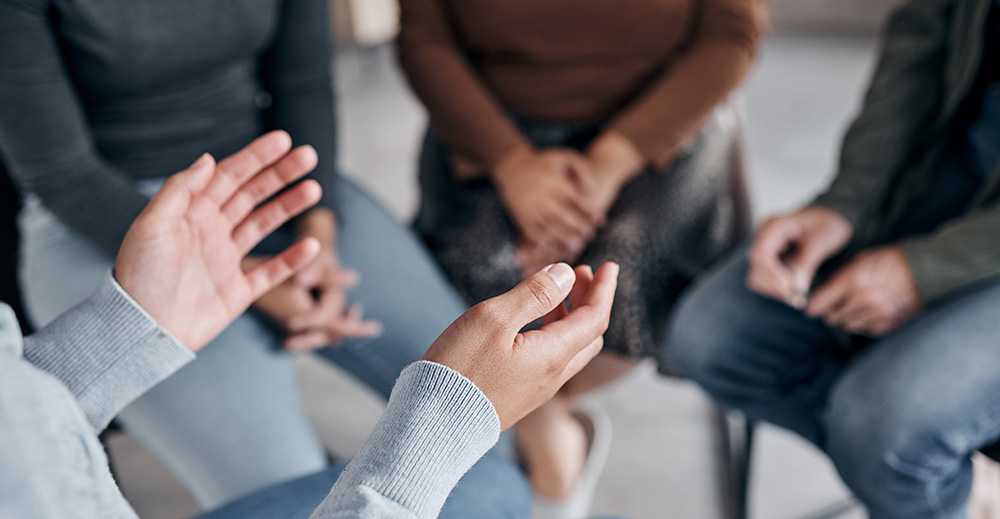Coming across this blog post could mark the start of your recovery journey, or you may be already there, seeking further assistance. Either way, you’ve landed in the right spot.
Addiction can make you feel very isolated and alone, but it doesn’t have to be that way.
Keep reading to delve into the world of peer support programs and to explore the role a peer-to-peer support specialist can play in your recovery.
What Are Peer Support Programs?
Peer support programs play a crucial role in many people’s journey to recovery from substance addiction or mental health issues. These programs are designed to bring together individuals who have faced similar addiction struggles, providing them with emotional, social, and practical support. Through shared experiences, participants foster trust and compassion, which are crucial in the healing process.
Some peer-support addiction and mental health programs include:
- Alcoholics Anonymous (AA)
- Narcotics Anonymous (NA)
- Dual Recovery Anonymous (DRA)
- SMART Recovery
- Depression and Bipolar Support Alliance (DBSA)
The Power of Shared Experience
The power of peer support rehab programs lies in mutual understanding through shared experiences. Consider these benefits:
- Feel connected and supported by others.
- Transform the often lonely recovery journey with the help of others.
- Boost self-esteem and confidence through encouragement from peers.
- Gain valuable insights by consulting experienced individuals.
- Learn practical ways to cope with adversity and recover.
What is a Peer-to-Peer Support Specialist?
A peer-to-peer supporter is someone who has personally experienced drug dependence or mental illness and now chooses to utilize their journey to help others in need. They have no medical background but provide crucial emotional support alongside hands-on care for individuals recovering from conditions like those mentioned above. They can be found in churches or recovery sites like hospitals or rehab facilities.
The Role of a Peer Support Specialist
- Offers one-to-one emotional assistance during challenging times.
- Organizes and guides collective sessions.
- Provides practical assistance to clients, including housing or employment location support.
- Serves as a living example of a person who has successfully managed to recover from addiction.
Qualities of an Effective Peer Support Specialist
The following are qualities that make a peer specialist good at their job:
- Empathy and understanding: They have undergone similar experiences and can thus relate with those they are assisting quite well.
- Good listening skills: PSSs never judge; instead, they listen actively, allowing individuals to express their thoughts and feelings openly.
- Trustworthiness: Those recovering from addiction often feel vulnerable, so peer specialists must keep private things shared in confidence.
- Non-judgmental attitude: They must understand that each person’s path to recovery differs from others; hence, they should not force their personal beliefs on anyone else.
Why Should You Consider a Peer Support Program?
You should include peer support in your recovery plan because they can provide:
- Empathy: Peer supporters have experienced what you are going through right now.
- Hope: Witnessing someone else’s successful journey out of addiction can be very inspiring; hence, one gets encouraged, too.
- Practical Advice: Peers can give advice regarding addiction recovery because they have first-hand experience.
- Reduced Stigma: These programs create a safe space where you don’t have to worry about being judged by others while sharing your innermost thoughts and feelings.
Thrive Group Treatment Centers: Your Peer in Recovery
Our team at Thrive Group Treatment Centers understands how crucial peer support is for anyone on their way back.
This is why we offer peer support programs in various locations across our centers.
- Thrive Treatment: Our Los Angeles drug rehab center’s Partial Hospitalization Program (PHP), Intensive Outpatient Program (IOP), and Outpatient Programs offer high levels of support to individuals struggling with addiction or mental health conditions.
- Thrive Teen: We have a teenage outpatient program catering to teenagers’ unique needs.
- The Last House: The Last House is a California sober living environment for men in recovery.
- The Nook: This is our Los Angeles sober living home for men and women, giving them a secure and caring place to live while recovering from addiction.
Are you at the beginning of your sobriety process? Or do you want someone who can offer an additional helping hand? Contact us at Thrive Group Treatment Centers.
We will walk together to heal, rejuvenate, and become better versions of ourselves.








